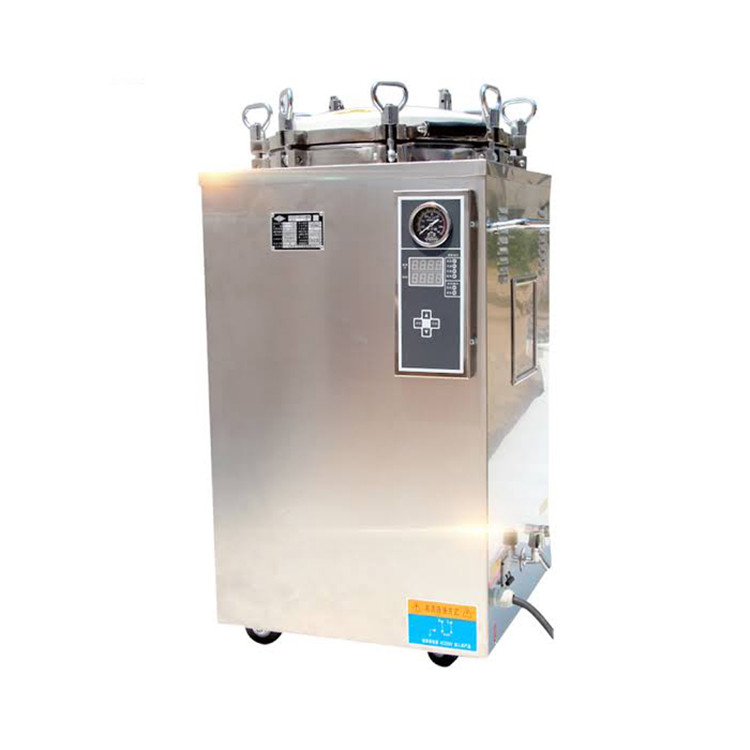Autoclaves are devices that use steam and high pressure to sterilize equipment and materials. it's used in many industries, including healthcare, food processing, and research. In terms of sterilization, autoclaves have very significant advantages and effects.
Advantages:
(1)Effective sterilization: Autoclaves are very effective at killing bacteria, viruses, fungi, and spores, making them ideal for sterilizing equipment and materials.
(2)Cost-effective: Autoclaves are a cost-effective method of sterilization compared to other methods.
(3)Easy to use: Autoclaves are easy to use, and the process of sterilization is automated, which reduces the chances of human error.
(4)No chemical residues: High temperature sterilization methods do not leave chemical residues on the sterilized materials, which may be an advantage in some applications.
Autoclaves are very effective at sterilizing equipment and materials. The combination of high pressure and high temperature used in autoclaves can kill bacteria, viruses, fungi, and spores, making it an ideal method for sterilization.
Why are autoclaves effective at sterilizing bacteria?
(1)High temperature: Autoclaves use high temperature, typically around 121°C (250°F) or higher, to kill microorganisms. The high temperature denatures proteins and disrupts the cell walls of microorganisms, causing them to die.
(2)High pressure: Autoclaves use high pressure, typically around 15 psi or higher, to ensure that the steam penetrates into the materials being sterilized. This helps to ensure that all microorganisms are exposed to the high temperature and are killed.
(3)Steam: The use of steam in autoclaves helps to ensure that the entire surface of the equipment or material being sterilized is exposed to the high temperature. Steam is an effective carrier of heat, allowing it to penetrate into materials and kill microorganisms.
(4)Automated process: Autoclaves are automated, which reduces the chances of human error and ensures that the sterilization process is consistent and effective.
(5)Versatile: Autoclaves can be used to sterilize a wide range of materials, including liquids, solids, and gases.
Overall, autoclaves are considered one of the most effective methods of sterilization for many types of equipment and materials.
But at the same time, autoclaves also have certain shortcomings and deficiencies in some aspects.
(1)Time-consuming: The process of sterilization in an autoclave can be time-consuming, which may not be ideal for situations where time is of the essence.
(2)Temperature limitations: Some materials may not be able to withstand the high temperatures and pressure of the autoclave, which may limit its use.
(3)Maintenance: Autoclaves require regular maintenance to ensure they are functioning correctly and remain effective at sterilization.
(4)Cost of equipment: Autoclaves can be expensive to purchase and maintain, which may be a barrier to their use in some settings.

After understanding the advantages and disadvantages of autoclaves,whether or not you should choose an autoclave depends on several factors, including the specific needs of your application, the type of materials you need to sterilize, and your budget.
Type of materials: Autoclaves are ideal for sterilizing materials that can withstand high temperatures and pressure, such as glassware, metal instruments, and biological waste. If you need to sterilize materials that are sensitive to heat or pressure, such as plastics or electronics, you may need to consider other sterilization methods.
Application requirements: If you work in a medical, research, or industrial setting where sterilization is critical, an autoclave may be necessary to ensure safety and compliance with regulations. However, if your application requires less stringent sterilization, other methods may be more cost-effective.
Capacity: Autoclaves come in various sizes, so you need to choose one that can accommodate the amount of materials you need to sterilize. If you have a small laboratory, a tabletop autoclave may be sufficient, but if you have a large facility, you may need a larger autoclave or multiple units.
Budget: Autoclaves can be expensive, so you need to consider your budget before making a decision. While there are lower-priced models available, you may need to invest in a higher-end unit to meet your needs.
Maintenance: Autoclaves require regular maintenance to ensure proper functioning and safety. You need to factor in the cost and time required for maintenance when making your decision.
In summary, you should choose an autoclave if you need to sterilize materials that can withstand high temperatures and pressure, if your application requires stringent sterilization, and if you can afford the cost and maintenance requirements.